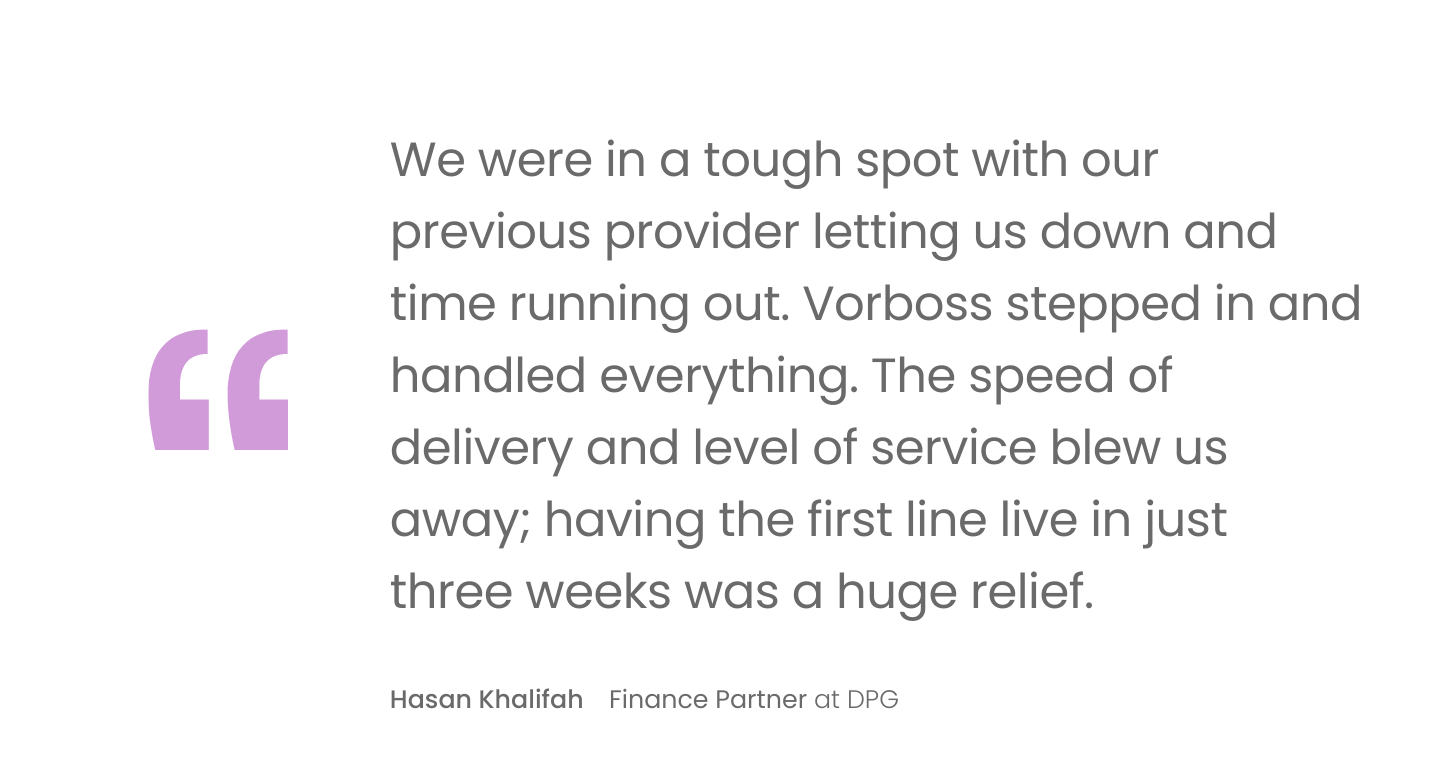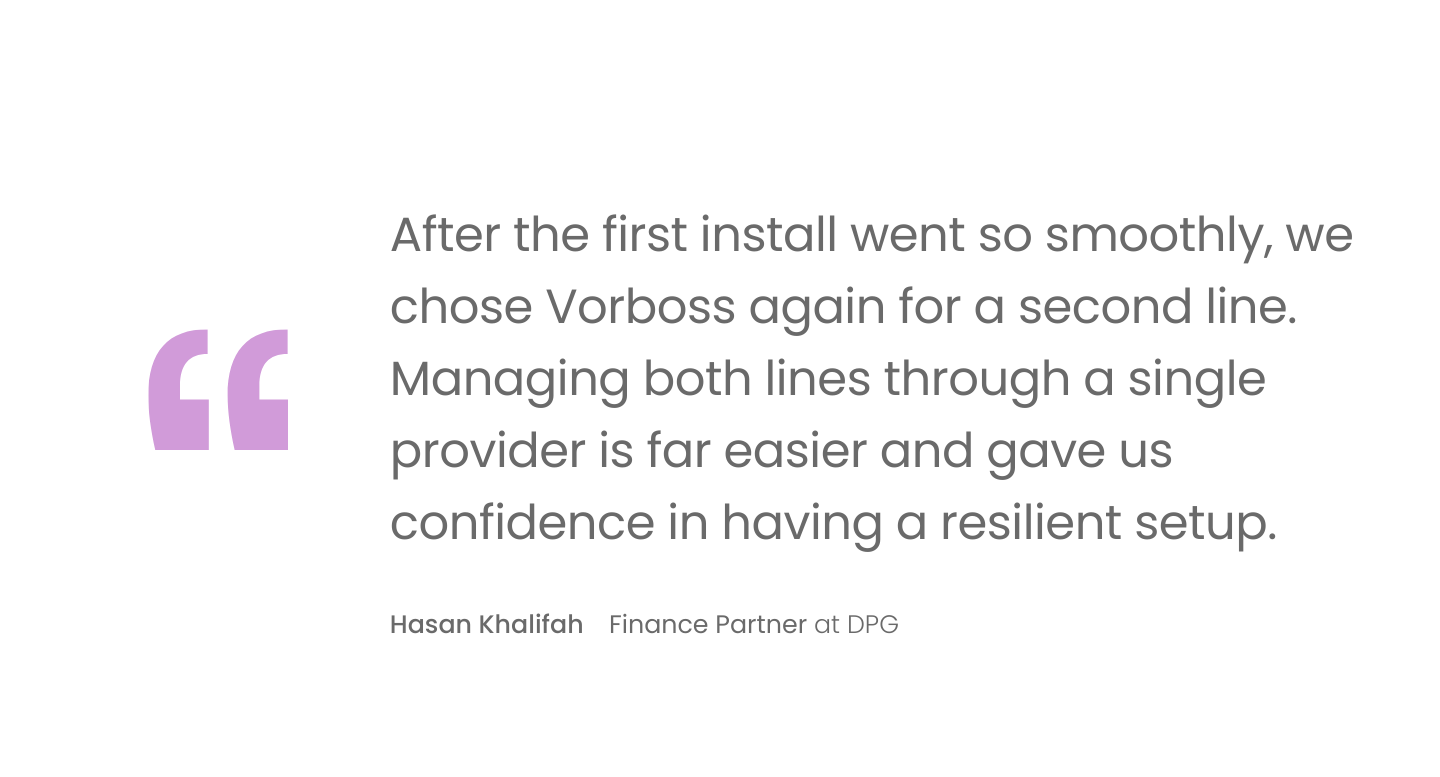.png)
Highlights
When law firm DPG’s internet provider failed to connect their new office in time, they needed a speedy solution to keep them on track for move-in day. Together with their managed service provider, they brought in Vorboss, who installed a leased line in only three weeks! They later added a second diverse circuit for extra resilience.

How DPG overcame last-minute delays to get online in 3 weeks
Anyone who’s managed an office move understands how much coordination it takes: logistics, tight deadlines, suppliers to manage, all while keeping the day job going. But when your internet provider, a well-known legacy player, lets you down just weeks before your move, things can get really stressful.

Three months to get connected – but the provider stalled
DPG is a specialist social justice law firm. With a team of 80, they rely on secure, fast connectivity to manage sensitive legal work.
They gave their internet provider three months’ notice to install a leased line at their new office. But as the move-in date approached, the provider asked for a further 60-day extension.
With just six weeks left to go before staff were due to move in, DPG had no choice but to cancel their contract and find a new supplier.
Six weeks to go and no internet in sight
Working with their managed service provider, DPG brought in Vorboss. Together, they aligned on a plan and used the rapid installation option, which meant their new office was connected in time for move-in day.

A second line for extra resilience
Once settled in, the firm decided to add a second line to make sure they had a resilient setup. Impressed with the first install, they used the same supplier, Vorboss, to keep things simple and efficient, while still benefiting from a truly diverse circuit and no vendor juggling.

Facing last-minute changes?
DPG switched providers just weeks before their move and now have a dedicated leased line connection scalable up to 100Gbps, built to support their business today and into the future.
Choosing the right partner like Vorboss, with the expertise and support to match, makes all the difference.
Tell us about yourself so we can serve you best.
Got a question?
Expedited installation incurs an additional fee:
7-day business internet installation: £15,000
14-day fast-track internet: £8,000
28-day priority internet service: £3,000
Prices exclude VAT and depend on building access requirements.
This service is currently available in Central London. For locations outside this area, we may offer alternative business internet solutions.
More articles
.png)
Internet connectivity is the lifeblood of modern businesses, powering operations, communication, and growth. But not all “fibre” connections are created equal.
All connections use fibre at some level, but performance, reliability, and guarantees vary depending on the underlying network. Choosing the right type of connection now can save downtime, frustration, and cost in the future.
In this guide, we'll explore key factors when selecting the ideal business internet provider to keep you connected and thriving.

Understand the connection types
Here’s a quick comparison of the three main fibre-based connections available to businesses:
FTTC and FTTP may work for small teams or low-risk work, but DIA is the only connection built for business-critical reliability, speed, and consistent performance.
Ask yourself these questions
Before comparing providers, clarify your internal needs:
- How critical is uptime for your business operations?
- Which teams rely heavily on cloud apps, video conferencing, or large file transfers?
- How much bandwidth do we need now, and how much will we need in 2–5 years?
- Are upload speeds as important as download speeds for our workflows?
- Would temporary downtime cause financial or reputational damage?
This self-assessment helps you match connection types to your business requirements.
.jpg)
Generative Pre-trained Transformers (GPTs) like OpenAI's ChatGPT are revolutionising industries across the board. From writing emails to creating educational content, they're powerful tools built to understand and generate human-like text. But the same tech that makes GPTs useful also makes them risky, particularly for cybersecurity.
In February 2024, Microsoft and OpenAI spotted several state-backed hacking groups from Russia, North Korea, Iran, and China using GPTs to improve their exploitation tactics. The Strontium group, linked to Russian military intelligence, has been found using large language models (LLM’s) to understand satellite communication protocols, radar imaging technologies, and other sensitive miliatry information.
But GPTs can also be misused in everyday cybercrime and by employees or contractors who have access to sensitive data.
How GPTs can be weaponised in everyday cybercrime
- Phishing: GPTs can generate convincing phishing emails that mimic real writing styles, making it more difficult to spot and harder for filters to block.
- Social engineering: these models can be used in live chats, like customer support, to trick people into giving up sensitive information. Connected to text-to-speech tools, they could also be used in voice scams.
- Malware code generation: even with filters in place, attackers can trick GPTs into writing malicious code.
- Data leakage: when employees input sensitive company information into these models, that data gets stored and could be leaked back to others.
- Misinformation: GPT’s can 'hallucinate', which means they present false information portrayed as fact. When spread, this can lead to real-world consequences such as political confusion or interference during a crisis.

.jpg)

.jpg)

